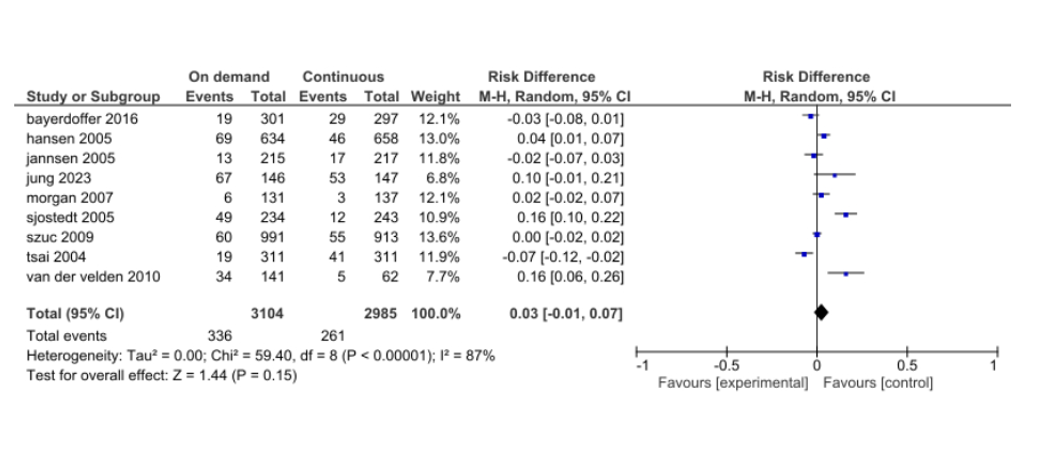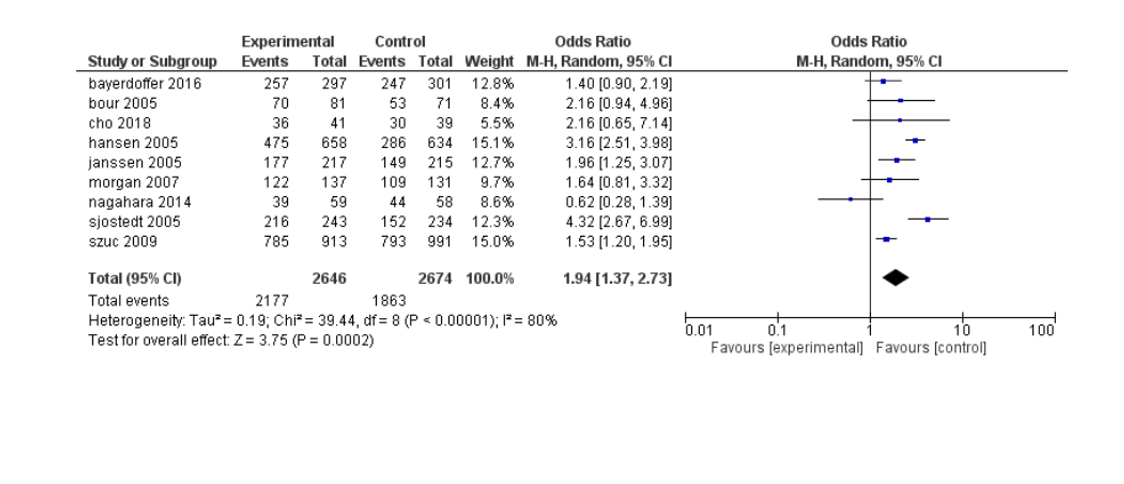Sunday Poster Session
Category: Esophagus
P0605 - On-Demand vs Continuous Proton Pump Inhibitor Therapy for GERD: A Systematic Review and Meta-Analysis
Sunday, October 26, 2025
3:30 PM - 7:00 PM PDT
Location: Exhibit Hall

Sunny Kumar, MD (he/him/his)
Wright Center for Graduate Medical Education
Scranton, PA
Presenting Author(s)
Sunny Kumar, MD1, Rahul Kumar, MD2, Ashok Kumar, MD3, Avinash Nankani, MBBS4, Anila Mahesh, MD5, Rubela Ray, MD6, Shubh Mehta, MBBS7, Fnu Arti, MD8, Sushrut Ingawale, MD, DNB, MBBS9, Fnu Aakash, MD10
1Wright Center for Graduate Medical Education, Scranton, PA; 2North Central Bronx Hospital, Bronx, NY; 3Ascension Saint Joseph Hospital, Chicago, IL; 4Dow University of Health Sciences, Karachi, Sindh, Pakistan; 5Geisinger Wyoming Valley Medical Center, Duryea, PA; 6University of Wyoming, Cheyenne, WY; 7BJ Medical College, Ahmedabad, Gujarat, India; 8Saint Francis Medical Center, Monroe, LA; 9Quinnipiac University - Frank H Netter MD School of Medicine, Bridgeport, CT; 10Florida State University, Cape Coral, FL
Introduction: Proton pump inhibitors (PPIs) are the mainstay for long-term management of gastroesophageal reflux disease (GERD). However, concerns regarding the adverse effects of prolonged use have led to increased interest in on-demand therapy as a potential alternative to continuous use. We conducted a meta-analysis of randomized controlled trials (RCTs) comparing the efficacy and safety of on-demand versus continuous PPI therapy for GERD maintenance.
Methods: A systematic search was conducted across major databases from inception to 2025 to identify RCTs comparing on-demand and continuous PPI therapy in adult GERD patients. In this analysis, on-demand therapy was designated as the experimental group and continuous therapy as the control group. The primary outcome was treatment failure. Secondary outcomes included symptom relief. Data were pooled using a random-effects model. For binary outcomes, odds ratios (ORs) or risk differences (RDs) with 95% confidence intervals (CIs) were calculated. Heterogeneity was assessed using the I² statistic.
Results: Twelve randomized controlled trials comprising 6,089 GERD patients were included in the analysis. The primary outcome, treatment failure, was not significantly different between on-demand and continuous PPI therapy (risk difference 0.03, 95% CI: –0.01 to 0.07, p = 0.15; I² = 87%). For secondary outcomes, on-demand therapy was associated with significantly lower symptom relief compared to continuous therapy (OR 1.94, 95% CI: 1.37–2.73, p < 0.005; I² = 80%). Importantly, on-demand use resulted in a substantial reduction in total PPI consumption, with several studies reporting up to a 50% decrease in cumulative use. Subgroup analysis suggested that on-demand therapy provided similar efficacy in patients with non-erosive or mild erosive disease, while continuous therapy appeared more effective in moderate-to-severe esophagitis. Sensitivity analyses excluding high-risk-of-bias studies confirmed the consistency and robustness of the findings.
Discussion: On-demand PPI therapy appears to be a safe and effective alternative to continuous therapy for the maintenance treatment of GERD in appropriately selected patients. While it may offer slightly less symptom relief, it achieves comparable treatment durability with a significant reduction in overall PPI exposure. These findings support its consideration in patients with non-erosive or mild erosive disease to minimize long-term medication use.

Figure: Figure 1. Forest plot of treatment failure rates in on-demand vs. continuous PPI therapy.

Figure: Figure 2. Forest plot of symptom relief in on-demand vs. continuous PPI therapy.
Disclosures:
Sunny Kumar indicated no relevant financial relationships.
Rahul Kumar indicated no relevant financial relationships.
Ashok Kumar indicated no relevant financial relationships.
Avinash Nankani indicated no relevant financial relationships.
Anila Mahesh indicated no relevant financial relationships.
Rubela Ray indicated no relevant financial relationships.
Shubh Mehta indicated no relevant financial relationships.
Fnu Arti indicated no relevant financial relationships.
Sushrut Ingawale indicated no relevant financial relationships.
Fnu Aakash indicated no relevant financial relationships.
Sunny Kumar, MD1, Rahul Kumar, MD2, Ashok Kumar, MD3, Avinash Nankani, MBBS4, Anila Mahesh, MD5, Rubela Ray, MD6, Shubh Mehta, MBBS7, Fnu Arti, MD8, Sushrut Ingawale, MD, DNB, MBBS9, Fnu Aakash, MD10. P0605 - On-Demand vs Continuous Proton Pump Inhibitor Therapy for GERD: A Systematic Review and Meta-Analysis, ACG 2025 Annual Scientific Meeting Abstracts. Phoenix, AZ: American College of Gastroenterology.
1Wright Center for Graduate Medical Education, Scranton, PA; 2North Central Bronx Hospital, Bronx, NY; 3Ascension Saint Joseph Hospital, Chicago, IL; 4Dow University of Health Sciences, Karachi, Sindh, Pakistan; 5Geisinger Wyoming Valley Medical Center, Duryea, PA; 6University of Wyoming, Cheyenne, WY; 7BJ Medical College, Ahmedabad, Gujarat, India; 8Saint Francis Medical Center, Monroe, LA; 9Quinnipiac University - Frank H Netter MD School of Medicine, Bridgeport, CT; 10Florida State University, Cape Coral, FL
Introduction: Proton pump inhibitors (PPIs) are the mainstay for long-term management of gastroesophageal reflux disease (GERD). However, concerns regarding the adverse effects of prolonged use have led to increased interest in on-demand therapy as a potential alternative to continuous use. We conducted a meta-analysis of randomized controlled trials (RCTs) comparing the efficacy and safety of on-demand versus continuous PPI therapy for GERD maintenance.
Methods: A systematic search was conducted across major databases from inception to 2025 to identify RCTs comparing on-demand and continuous PPI therapy in adult GERD patients. In this analysis, on-demand therapy was designated as the experimental group and continuous therapy as the control group. The primary outcome was treatment failure. Secondary outcomes included symptom relief. Data were pooled using a random-effects model. For binary outcomes, odds ratios (ORs) or risk differences (RDs) with 95% confidence intervals (CIs) were calculated. Heterogeneity was assessed using the I² statistic.
Results: Twelve randomized controlled trials comprising 6,089 GERD patients were included in the analysis. The primary outcome, treatment failure, was not significantly different between on-demand and continuous PPI therapy (risk difference 0.03, 95% CI: –0.01 to 0.07, p = 0.15; I² = 87%). For secondary outcomes, on-demand therapy was associated with significantly lower symptom relief compared to continuous therapy (OR 1.94, 95% CI: 1.37–2.73, p < 0.005; I² = 80%). Importantly, on-demand use resulted in a substantial reduction in total PPI consumption, with several studies reporting up to a 50% decrease in cumulative use. Subgroup analysis suggested that on-demand therapy provided similar efficacy in patients with non-erosive or mild erosive disease, while continuous therapy appeared more effective in moderate-to-severe esophagitis. Sensitivity analyses excluding high-risk-of-bias studies confirmed the consistency and robustness of the findings.
Discussion: On-demand PPI therapy appears to be a safe and effective alternative to continuous therapy for the maintenance treatment of GERD in appropriately selected patients. While it may offer slightly less symptom relief, it achieves comparable treatment durability with a significant reduction in overall PPI exposure. These findings support its consideration in patients with non-erosive or mild erosive disease to minimize long-term medication use.

Figure: Figure 1. Forest plot of treatment failure rates in on-demand vs. continuous PPI therapy.

Figure: Figure 2. Forest plot of symptom relief in on-demand vs. continuous PPI therapy.
Disclosures:
Sunny Kumar indicated no relevant financial relationships.
Rahul Kumar indicated no relevant financial relationships.
Ashok Kumar indicated no relevant financial relationships.
Avinash Nankani indicated no relevant financial relationships.
Anila Mahesh indicated no relevant financial relationships.
Rubela Ray indicated no relevant financial relationships.
Shubh Mehta indicated no relevant financial relationships.
Fnu Arti indicated no relevant financial relationships.
Sushrut Ingawale indicated no relevant financial relationships.
Fnu Aakash indicated no relevant financial relationships.
Sunny Kumar, MD1, Rahul Kumar, MD2, Ashok Kumar, MD3, Avinash Nankani, MBBS4, Anila Mahesh, MD5, Rubela Ray, MD6, Shubh Mehta, MBBS7, Fnu Arti, MD8, Sushrut Ingawale, MD, DNB, MBBS9, Fnu Aakash, MD10. P0605 - On-Demand vs Continuous Proton Pump Inhibitor Therapy for GERD: A Systematic Review and Meta-Analysis, ACG 2025 Annual Scientific Meeting Abstracts. Phoenix, AZ: American College of Gastroenterology.
